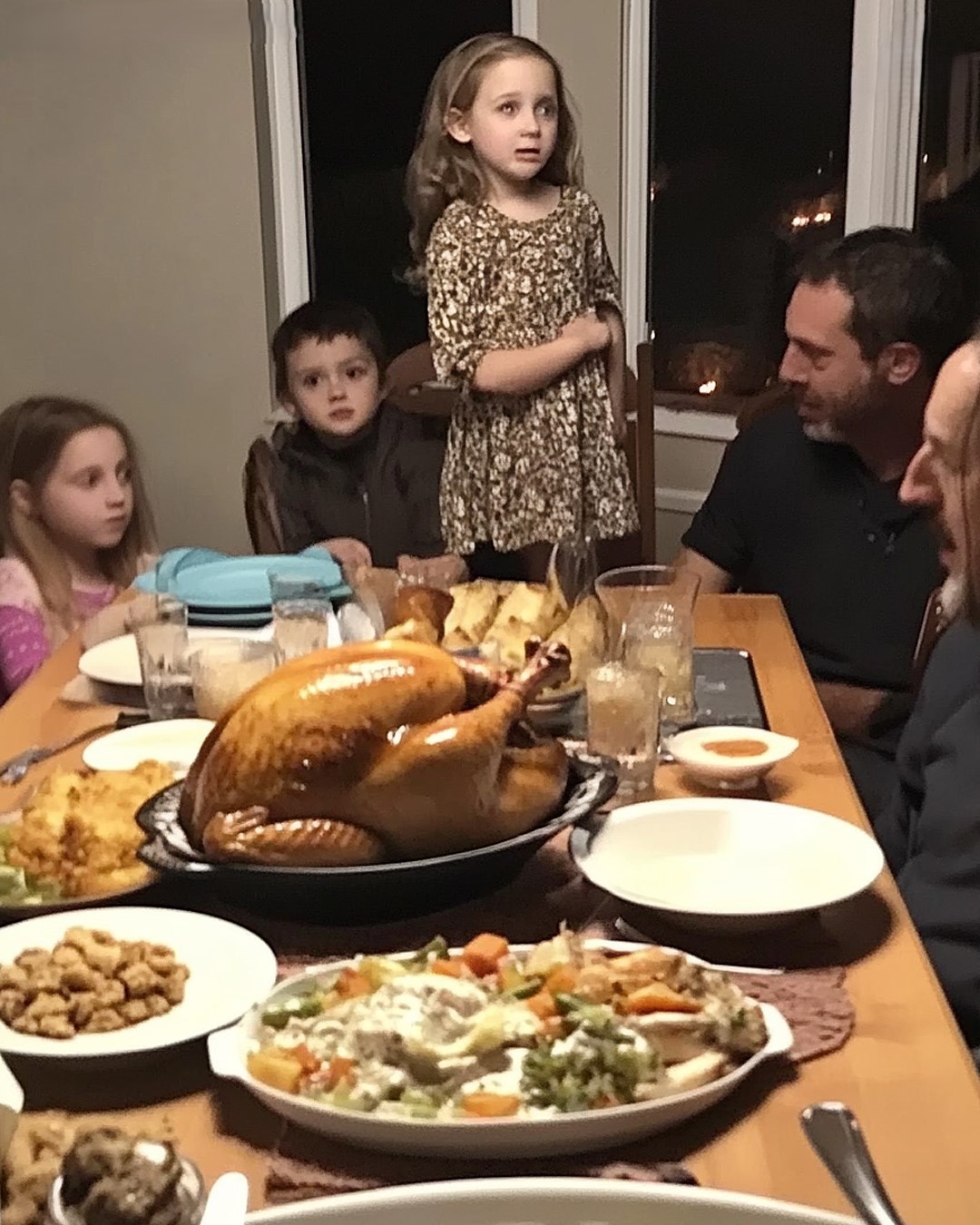At Thanksgiving Dinner, My Daughter Stood up and Shouted, And Where is the Woman Dad Keeps in Our Shed

Thanksgiving dinner is usually a time for joy, connection, and gratitude, but this year, it brought an unexpected revelation that could have unraveled our family.
Everything was perfect—or so it seemed. The table was set with fine china, the tantalizing aroma of turkey filled the air, and the house buzzed with laughter and excitement. My husband, Peter, was putting the final touches on the turkey, and I was busy making sure everyone felt comfortable. Our eight-year-old daughter, Emma, however, seemed restless. She kept glancing out the window, fidgeting with the hem of her dress, and avoiding Peter’s warm smiles.
Emma’s unusual behavior nagged at me, but I chalked it up to anticipation for the meal or her cousins’ arrival. Then, just as we were about to begin carving the turkey, Emma climbed onto her chair, her small frame demanding the room’s attention.
“And where is SHE?!” she declared, her voice cutting through the lively chatter.
The room fell silent. My stomach sank as I tried to make sense of her words. “Who are you talking about, sweetie?” I asked, my voice shaky.
Emma turned her piercing gaze toward Peter. “The woman Dad keeps hidden in our shed!”
The words hit like a thunderclap. Shock rippled across the table as all eyes darted to Peter, whose face had turned ashen. I forced a strained smile, trying to diffuse the tension. “Emma, you must be mistaken—”
But she wasn’t backing down. “No, Mom! She’s in the shed right now! I saw her last week, and Dad visits her when you’re at work.”
Peter’s discomfort was palpable. He avoided eye contact as murmurs spread among our guests. After a long, tense pause, he finally said, “Emily, we need to talk.”
He gestured for me to follow him outside. My heart raced as we crossed the yard toward the old shed. It had always been just a storage space for tools and gardening supplies—nothing more. Yet with every step, a sense of dread grew heavier.
Peter hesitated at the shed door, his voice barely above a whisper. “I didn’t want you to find out like this. I’m so sorry.” He pushed the door open, and there, in the dim light, sat a woman. She looked to be in her 50s, her face etched with lines of hardship. Dressed in worn clothes, her gray-streaked hair fell loosely around her weary face.
“Who… who is she?” I stammered, glancing at Peter in disbelief.
He swallowed hard, his voice trembling. “Emily, this is Janet. She’s… my biological mother.”
My mind reeled. “Your mother? I thought she was… gone.”
Peter nodded grimly. “That’s what I told everyone. She abandoned me when I was a child, and I was put up for adoption. But a few months ago, I found her begging on the streets near my work. She was homeless, struggling. I couldn’t just leave her, but I didn’t know how to tell you.”
Janet’s voice broke the silence. “I didn’t mean to cause trouble. I told Peter not to worry about me, but he insisted on helping.” Her eyes brimmed with regret, and her frailty softened the anger bubbling inside me.
“What was your plan, Peter?” I asked, fighting back tears. “Were you ever going to tell me?”
“I didn’t know how,” he admitted, his voice heavy with guilt. “I was afraid of what you’d think of me, of her. I thought I could manage it without turning our lives upside down.”
I took a deep breath, trying to process everything. This wasn’t about infidelity or betrayal—it was about a man grappling with a painful past and trying to make peace with it.
Turning to Janet, I said, “If you need help, we’ll figure it out. But you don’t have to hide out here.” Her tearful gratitude was humbling, and I realized this was an opportunity for healing, not division.
When we returned to the house, the atmosphere shifted. I introduced Janet as Emma’s grandmother, and while confusion lingered on the faces of Peter’s adoptive parents, everyone welcomed her with warmth. Emma, ever the curious child, walked up to Janet. “Are you really Dad’s mom?” she asked.
Janet nodded, managing a small smile. “Yes, sweetheart. I’m your grandma.”
Emma beamed. “Does that mean you’re staying for Thanksgiving?”
Janet looked at me hesitantly, and I nodded. “Yes,” I said. “She’s staying.”
As Emma snuggled into her newfound grandmother’s arms, I reached for Peter’s hand. “Family is family,” I whispered, meeting his tear-filled eyes. “And I’m thankful we’re together.”
That night, we raised our glasses, not just to Thanksgiving, but to forgiveness, second chances, and the imperfect, messy love that binds a family together.